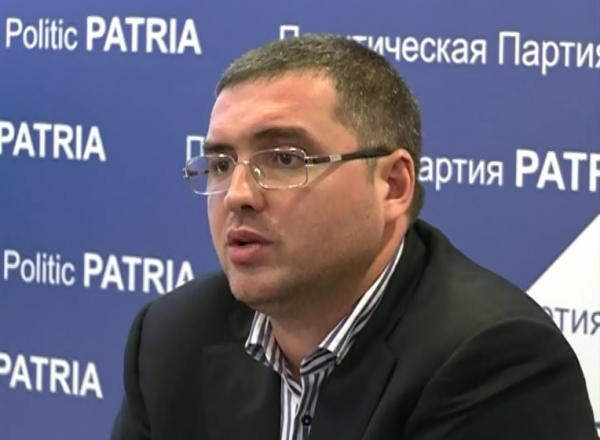
Inside Moldova’s Governing Coalition After the Elections (Part Three)
Publication: Eurasia Daily Monitor Volume: 11 Issue: 219
By:

Renato Usatyi’s “Patria” party, a Russian entry in Moldova’s political arena (see EDM, December 3, 4), propagated three messages in this campaign: 1) against the European Union, and for the Russia-led Customs Union/Eurasian Union; 2) against the Moldovan Communist Party’s leadership under Vladimir Voronin, so as to annex the decapitated Communists to a post-electoral coalition with the radically pro-Moscow Socialist Party; and 3) against Liberal-Democrat leader Vlad Filat (see above). The efforts of Usatyi’s “Patria” contributed to the two most worrisome results of the November 30 elections, namely: the Socialist Party’s rise at the expense of the moderate Communist Party in the opposition; and the growth of the Democratic Party at the expense of the pro-Western team in the coalition government.
Democratic Party-controlled media replayed Usatyi’s systematic attacks against Filat during the electoral campaign. EU diplomats had brokered an informal non-aggression pact between Vlad Plahotniuc’s Democratic Party and Filat’s Liberal-Democrats in order to keep the coalition together (see Part One, EDM, December 5). The Democratic Party, in effect, circumvented that agreement by using its media to disseminate Usatyi’s attacks on Filat with attribution to Usatyi (Jurnal de Chisinau, December 4).
The Pro-Europe Coalition has governed Moldova from 2009 to date. Throughout this period the three parties have negotiated and re-negotiated their power-sharing arrangements, distributing and re-distributing governmental posts. The Democratic Party became the winner, the Liberal-Democrat Party the loser in this zero-sum game within the coalition. The spectacle of permanent infighting compromised the coalition’s European brand in the perception of many voters. Such was also the net outcome of the November 30, 2014 elections. The damage was, however, distributed very unevenly among the coalition’s parties. Plahotniuc’s party did not have a core pro-Western electorate to disappoint, and emerged stronger from these elections. Filat’s and Prime Minister Iurie Leanca’s party did have that core electorate, disappointed it and had to take the damage. Ghimpu’s pro-Romanian electorate seems immune to political fluctuations.
Based on the election’s results, Plahotniuc is strongly positioned to demand an even larger share of power, at the expense of the coalition’s still-leading but somewhat diminished party. Meanwhile, Ghimpu’s party retains its rock-solid voter share and its negotiating leverage intact. The Liberal-Democrats risk being caught yet again in the crossfire of the other two parties in the upcoming coalition negotiations. This party is still the strongest and has the first claim to the prime minister’s post. Party leader Filat supports Leanca to continue as prime minister (Timpul, December 5).
A deadlock might necessitate co-opting the Communist Party into a new parliamentary majority (as distinct from a full-fledged governing coalition). The elections just held have enfeebled the Communists irreparably, but that party still holds a crucial 21 parliamentary seats. Negotiations with the Communists could help vote in the new government; and by the same token isolate the pro-Kremlin Party of Socialists, which placed first in these elections. Some kind of deal with the Communists will be indispensable to amending the dysfunctional Constitution in 2015 (this would require 68 ayes in the 101-seat parliament) and/or electing the next head of state (requiring 62 ayes under the existing basic law). Failure to muster the necessary majorities for amending the Constitution and electing a state president was at the origin of Moldova’s constitutional and political crises during the last five years.
Local and visiting analysts have aired some recommendations for the three parties’ leaders to avoid yet another coalition crisis over power-sharing and to expedite the formation of the new government. Priority recommendations include (Jurnal.md, November 27, December 3, 4, 5; Radio Free Europe, December 2; Ziarul National, December 6; voxreport.unimedia, December 7):
— Negotiations among the parties over distribution of government posts to be held in the presence of European Union officials and with public transparency;
— Selecting the heads of law enforcement and regulatory agencies on professional criteria by open competition, outside the political party quota system (the Democratic Party has held the lion’s share of such posts from 2010 to date);
— Inviting the EU to send a EULEX-type (European Union Rule of Law) mission to assist the reform of Moldova’s judiciary and law enforcement institutions;
— Passing the overdue legislation on transparency of mass media ownership and on public financing of political parties within 100 days of the opening of the new parliament;
— Developing a concept of information security to mitigate the Russian state-controlled media’s hegemony in Moldova.




